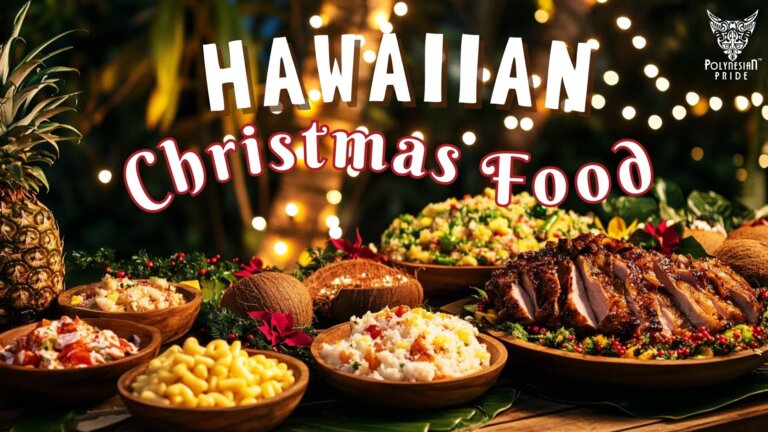Exploring the Culture & Heritage of French Polynesian People

French Polynesia, a breathtaking archipelago in the South Pacific, captivates travelers with its idyllic beaches and vibrant culture. This region, composed of 118 islands and atolls, is not just a paradise of turquoise waters but a testament to the resilience and ingenuity of its people. The French Polynesian People’s rich cultural tapestry, woven from ancestral heritage, colonial influences, and modern adaptations, offers a fascinating glimpse into their journey. This article delves into the historical background, language, religion, traditions, social structures, and contemporary challenges the French Polynesians face.
Historical Background of French Polynesia

Early Settlers and Indigenous Tribes
The saga of the French Polynesian people begins with a profound voyage across the Pacific Ocean, a testament to the remarkable navigation skills honed by their ancestors. The first Polynesian settlers, believed to have originated in Southeast Asia, embarked on daring journeys thousands of years ago, arriving in the islands and establishing a thriving civilization. These intrepid voyagers brought their language, traditions, and cultural heritage that continue to shape French Polynesian life today.
The Maohi people, the indigenous inhabitants of these islands, played a pivotal role in developing Polynesian culture. Renowned for their expertise in seafaring and agriculture, the Maohi created a vibrant society that honored ancestral spirits, revered the natural world, and celebrated life in a unique blend of spirituality and pragmatism. Their connection to the land and sea profoundly influenced their way of life, social structures, and community dynamics.
The arrival of the first permanent settlers in French Polynesia brought the Lapita culture, which flourished across the Pacific. Characterized by unique pottery designs, sophisticated tools, and advanced agricultural practices, the Lapita culture left an indelible mark on Polynesian society. It laid the foundation for developing diverse languages, social structures, and religious beliefs that have endured for centuries.
Colonial History and Influence

The arrival of Europeans in the 16th century marked a turning point in French Polynesian history. European explorers, drawn by the allure of the island’s beauty and resources, initiated a period of interaction that would ultimately lead to colonization. The French claimed the islands as part of their colonial empire in the 19th century, significantly influencing the region’s political, social, and cultural landscape.
The impact of French colonization on local customs and traditions was profound, leading to assimilation and resistance. While French Polynesia gained more autonomy over time, the enduring legacy of colonization remains woven into French Polynesian society. The introduction of the French language, legal system, and administrative structures created a complex sociopolitical environment that continues to shape the identity of the French Polynesian people.
During this period, the French Polynesian people faced the challenge of adapting to a new world order while cherishing their cultural heritage. The colonial era witnessed a persistent struggle for identity, balancing the need to preserve traditional ways of life with the pressures of assimilation. Yet, the resilience of the French Polynesian people allowed them to adapt and integrate elements of French culture while maintaining their unique traditions.
Resistance and Adaptation

The French Polynesian people’s ability to navigate the complexities of colonial history is a testament to their extraordinary resilience. Throughout the colonial period, they engaged in acts of resistance against oppressive policies while simultaneously finding ways to adapt to the changing sociopolitical landscape. This duality of resistance and adaptation has become a defining characteristic of the French Polynesian identity.
Cultural preservation efforts emerged as a response to the challenges posed by colonization. The French Polynesian people sought to reclaim and revitalize their traditions, languages, and customs, ensuring that future generations would inherit a rich cultural legacy. Through community gatherings, festivals, and educational initiatives, they fostered a sense of pride in their heritage, celebrating their unique identity amidst the influences of modernization.
As French Polynesia gained greater autonomy in the latter half of the 20th century, the French Polynesian people continued to assert their cultural identity while navigating the complexities of globalization. The interplay between tradition and modernity remains a central theme in their ongoing journey, reflecting their commitment to preserving their heritage while embracing the opportunities of the contemporary world.
Language and Communication
Official Languages
French Polynesia is a multilingual society with a captivating interplay of tongues. The official languages – French and Tahitian – reflect the linguistic landscape shaped by colonial history and indigenous heritage. French, introduced through colonization, holds an official status and serves as the language of administration, education, and commerce.

Tahitian, the language of the Maohi people, maintains its significance as a pillar of cultural identity and is also an official language. The presence of these two languages reveals the intricate tapestry of French Polynesian society, where the coexistence of languages symbolizes the blending of cultures and histories.
Beyond French and Tahitian, many other Polynesian languages are spoken across the islands. These languages, each with unique nuances and expressions, showcase the region’s diverse linguistic heritage. The presence of these languages is a vital part of the cultural tapestry, reflecting the rich history and interconnectedness of Polynesian communities.
Influence of Language on Identity and Cultural Preservation
Language in French Polynesia is not merely a tool for communication; it is a powerful symbol of identity, cultural preservation, and resilience. Maintaining these languages is seen as an essential means of safeguarding the heritage of the French Polynesian people. The survival of Tahitian and other indigenous languages is crucial for passing down traditional knowledge, stories, and customs from one generation to the next.
Recognizing the importance of language preservation, French Polynesia has embarked on various initiatives to promote its native tongues. Educational institutions have incorporated Tahitian and other Polynesian languages into their curricula, encouraging fluency and cultural understanding among younger generations. Cultural organizations also actively revitalize and promote these languages through workshops, festivals, and community programs.

Language Preservation Efforts
While these efforts are commendable, preserving language diversity in French Polynesia faces significant challenges. The influence of French, coupled with the allure of globalization, threatens the continuity of traditional languages. To ensure the survival of these languages, continuous efforts are needed to develop language programs, promote language use in everyday life, and instill pride in cultural heritage.
Community engagement plays a vital role in language preservation. Local initiatives that encourage the use of Tahitian in daily conversations, storytelling sessions, and cultural events help reinforce the importance of language as a vehicle for artistic expression. Moreover, integrating technology and social media platforms can serve as innovative language learning and dissemination tools, reaching younger audiences and fostering a sense of belonging to their cultural roots.
Religion and Spiritual Beliefs
Traditional Polynesian Beliefs
French Polynesian spirituality is a fascinating blend of traditional beliefs and Christian influences, creating a unique religious landscape. Before the arrival of Christianity, the French Polynesian people held a profound reverence for ancestral spirits and the natural world. The spiritual realm played a vital role in their everyday life, influencing their beliefs, practices, and social structures.
Ancestral worship was deeply ingrained in Polynesian culture. The spirits of ancestors were believed to watch over the living, influencing their actions and guiding their destinies. The concept of mana, a spiritual force residing in both humans and the natural world, played a central role in their beliefs. Mana was associated with power, authority, and the ability to influence events, shaping the social hierarchy and community dynamics.
The Polynesian people recognized the sanctity of nature, viewing the ocean, mountains, and forests as spiritual entities that deserved reverence. Their relationship with the natural world was intertwined with their understanding of their place within the cosmic order. Rituals and ceremonies were conducted to honor these natural elements, reinforcing the connection between spirituality and the environment.

Influence of Christianity
Missionaries’ introduction of Christianity in the 19th century profoundly impacted Polynesian religious practices. While some embraced the new faith, others resisted its forceful assimilation. Blending Christian beliefs with traditional practices resulted in a unique form of syncretism that continues to shape contemporary French Polynesian spirituality.
Christianity’s integration into Polynesian society led to a fascinating blending of traditions. Christian rituals often incorporated elements of traditional beliefs. The celebration of Easter, for instance, might involve the integration of traditional Polynesian dances and chants, reflecting an interplay of faith and culture. This syncretic approach allows the French Polynesian people to honor their ancestral heritage while embracing the teachings of Christianity.
Today, French Polynesia is predominantly Christian, with Catholic and Protestant denominations holding significant influence. However, traditional beliefs play a vital role in daily life, influencing attitudes towards nature, family, and community. French Polynesians have effectively integrated their ancestral heritage into their modern faith, creating a vibrant and unique religious landscape.

Contemporary Religious Practices
In contemporary French Polynesia, religious practices reflect a harmonious coexistence of traditional and Christian beliefs. Community gatherings, such as church services and cultural festivals, are essential for the French Polynesian people to unite, celebrate their faith, and reaffirm their cultural identity. These events often feature traditional music, dance, and storytelling, showcasing the richness of their heritage.
Moreover, family and community values remain central to religious practices. The concept of ‘ohana,’ or extended family, underscores the importance of collective support and unity within the community. Spiritual teachings often emphasize compassion, respect, and gratitude, aligning with traditional Polynesian values prioritize harmony and interconnectedness.
The interplay between faith and tradition is a source of strength and resilience, empowering French Polynesian people to embrace their identity and forge a path forward.
Traditional French Polynesia Culture
Festivals and Celebrations
The vibrant traditions of the French Polynesian people are a testament to their creativity, skill, and love for life. Their culture reflects their deep connection to nature, community, and heritage, from festivals and celebrations to art forms and culinary delights. French Polynesia explodes with life during its numerous festivals and celebrations, showcasing the vibrancy of its cultural heritage.
Heiva i Tahiti, a major cultural festival held annually in July, is a vibrant showcase for traditional dance, music, and sports. This festival is an opportunity for the people of Tahiti and French Polynesia to unite, celebrate their heritage, and showcase their talents to the world. The festival features colorful costumes, rhythmic drumming, and captivating performances that transport spectators into the heart of Polynesian culture.

In addition to Heiva i Tahiti, various island-specific festivals celebrate local customs and traditions. These events often include traditional games, food stalls, and craft exhibitions, allowing visitors to immerse themselves in the rich cultural tapestry of French Polynesia. The sense of community and shared joy during these celebrations reinforces the bonds among the French Polynesian people, fostering a sense of belonging and pride in their heritage.
Arts and Craftsmanship
Traditional arts and crafts hold a special place in the hearts of the French Polynesian people. They serve as a means of cultural expression and storytelling. Carving, weaving, and tapa cloth making are among the most cherished art forms, each imbued with symbolism and meaning.
Carving, particularly in wood and stone, showcases the skill and creativity of Polynesian artisans. Intricate designs often depict ancestral figures, animals, and natural elements, reflecting the deep connection between the artists and their environment. On the other hand, weaving utilizes materials such as pandanus leaves and coconut fibers to create beautiful baskets, mats, and hats. These handcrafted items serve practical purposes and carry cultural significance, representing the artistry and craftsmanship of the French Polynesian people.

Tapa cloth making, a traditional practice involving beating tree bark into fabric, is another essential aspect of Polynesian art. Tapa cloths are often adorned with intricate patterns and designs, serving as ceremonial garments, wall hangings, or gifts for special occasions. The creation of tapa cloth is a communal activity, bringing families and communities together to celebrate their heritage.
Traditional Music and Dance
Music and dance are integral components of French Polynesian culture, serving as powerful expressions of joy, spirituality, and community. Traditional Polynesian music is known for its rhythmic and melodic qualities, often incorporating natural sounds like the ocean, wind, and birdsong. These elements are not only artistic expressions but also connect to the natural world and the island’s cultural heritage.

Traditional Instruments
- Ukulele: Although often associated with Hawaii, the ukulele has its roots in the Portuguese instruments brought to the islands. It has since become a beloved instrument in French Polynesia, playing a central role in many musical performances.
- Pahu: This traditional slit drum, made from a hollowed-out log, provides the rhythmic heartbeat of Polynesian music. The pahu is essential in traditional ceremonies and dances, adding depth and resonance to the performances.
- Nose Flute: The nose flute is a unique instrument that produces a haunting and ethereal sound, often used in ceremonial and spiritual contexts. Its delicate tones are considered a symbol of Polynesian heritage, usually played during storytelling and special occasions.
Traditional Dance
Polynesian dance is renowned for its graceful and expressive movements, often accompanied by rhythmic drumming and chanting. Each dance form has its unique style and significance, reflecting the rich cultural diversity of French Polynesia.

- Ori Tahiti: The most famous form of Polynesian dance, Ori Tahiti, is characterized by flowing hand and hip movements representing the waves, wind, and nature. This dance form vividly expresses the connection between the dancers and their environment.
- Haka: Originating from New Zealand, the haka has been adopted and adapted by Polynesian cultures in French Polynesia. It is a powerful and energetic dance form often performed in groups, emphasizing strength, unity, and cultural pride.
- Tamure: Known for its rapid footwork and intricate hand movements, Tamure showcases the dancers’ athleticism and skill. It is a lively dance that embodies the joy and spirit of Polynesian celebrations.
Staple Foods and Traditional Dishes
French Polynesian cuisine reflects the island’s rich natural resources and cultural diversity. Poisson cru is a cornerstone of this cuisine – a refreshing dish from raw fish marinated in coconut milk and lime juice, often complemented with fresh vegetables and herbs. This dish showcases the island’s abundant seafood and highlights their tropical flavors.

Other traditional dishes include ma’a Tahiti, a comforting dish of slow-cooked meats and vegetables that embodies the heartiness of Polynesian cooking. Firi firi, a conventional Polynesian doughnut flavored with coconut and spices, offers a sweet counterpoint to savory dishes. These foods represent the harmonious blend of indigenous ingredients and time-honored cooking techniques passed down through generations.

Social Structure and Community Life
Traditional Social Hierarchy
Traditional French Polynesian society is organized around extended families, or ‘ohana, with each family unit playing a crucial role in the community’s functioning. At the top of the social hierarchy are the chiefs, or ‘ariki’, who hold significant authority and are believed to possess spiritual power or mana. Chiefs are responsible for the well-being of their communities, maintaining social harmony, resolving conflicts, and organizing community activities.
Below the chiefs are the ‘rahiri’, or nobility. They assist the chiefs in their duties and hold influential positions within the community, often possessing specialized knowledge and skills. The ordinary people, or ‘manahune’, form the largest segment of the population and are involved in various occupations, such as farming, fishing, and crafting. Despite their lower status, their roles are valued and respected, contributing to the community’s prosperity.
Community and Family Values
The French Polynesian people strongly emphasize community and family values, fostering a sense of unity and mutual support. Elders are revered for their wisdom and experience, and their guidance is sought in matters of importance. Community gatherings and ceremonies play a central role in social life, providing opportunities for individuals to connect, share stories, and celebrate their cultural heritage. Festivals, weddings, and other communal events are marked by traditional music, dance, and feasting, reinforcing the bonds of kinship and solidarity.
Contemporary Social Dynamics
Traditional social structures coexist with contemporary influences in modern French Polynesia, creating a dynamic and evolving society. While the role of chiefs and traditional leaders remains significant, modern governance and education have introduced new avenues for social mobility and leadership. Urbanization and economic development have brought about changes in lifestyle and social interactions.
While extended families remain important, nuclear families have become more common in urban areas. Influenced by global trends and technology, the younger generation navigates a delicate balance between preserving cultural heritage and embracing modern opportunities. Despite these changes, the core values of respect, unity, and community remain deeply ingrained in French Polynesian society.
Conclusion
The French Polynesian people embody resilience, creativity, and a deep connection to their heritage. They maintain their cultural identity by celebrating traditions while embracing modern opportunities. Cultural preservation is crucial, ensuring that future generations inherit a rich legacy. This dedication empowers them to navigate globalization and environmental changes.
Visit the islands for a firsthand experience of French Polynesian culture. Engage with local communities, participate in cultural events, and explore stunning landscapes to truly appreciate the rich tapestry of this unique culture. Come and discover the warmth and hospitality of French Polynesia!
FAQs
What are French Polynesian people called?
The Tahitians (Tahitian: Māʼohi; French: Tahitiens) are the Indigenous Polynesian people of Tahiti and thirteen other Society Islands in French Polynesia. The numbers may also include the modern population in these islands of mixed Polynesian and French ancestry
Who are the ancestors of French Polynesia?
The direct ancestors of the Polynesians are believed to be the Neolithic Lapita culture.
Are people born in French Polynesia French citizens?
The relaxed island culture is as far removed from the bustle and grind of Paris and Marseilles as you can get, yet French Polynesia is part of France (maybe the name gave it away), and French Polynesians are French citizens
What are some traditional customs of the French Polynesian people?
Traditional customs include ancestral worship, community gatherings, and the celebration of festivals like Heiva i Tahiti. Arts and crafts such as carving, weaving, and tapa cloth making are also significant cultural practices.
What is the role of religion in French Polynesian culture?
Religion in French Polynesia is a blend of traditional beliefs and Christianity. Ancestral worship and reverence for nature coexist with Christian practices, creating a unique spiritual landscape.

I am Leilani Miller – I research focusing on Vanuatu – volcanic landscapes, blue holes, coral reefs & rainforests. I have over five years of experience researching and sharing insights on tourism and environmental activism. Explore and experience without limits through my latest article.
Contact information:
Email: [email protected]
Tel: +1 (808) 555-1528






